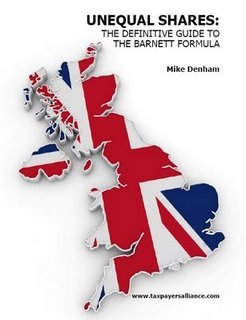 Many thanks to Mike Denham – the author of a Taxpayers’ Alliance report on the Barnett Formula, released today – for the following post…
Many thanks to Mike Denham – the author of a Taxpayers’ Alliance report on the Barnett Formula, released today – for the following post…
In the last week, the allocation of money between England and Scotland has been in the news with the Scottish National Party planning to abolish council tax in Scotland, replace it with a local income tax and have English taxpayers foot a part of the bill. The Government’s Calman Commission, set up to review devolution, is mandated to investigate whether fiscal devolution would be a good idea.
Disputes over the distribution of taxpayers money between Scotland and England aren’t new, but those disputes have rarely been well informed. Today’s report aims to remedy that situation by providing a comprehensive analysis of how the various mechanisms to disburse money to the different regions have operated.
For the last 30 years the Barnett Formula has been used to allocate British taxpayers’ cash between England, Scotland, Wales, and Northern Ireland. It has been widely blamed for the substantial public spending gap that exists between England and the three devolved territories.
Identifiable public spending per head in England is running at £7,535 pa (2007-08). But in Scotland it is 22 per cent (£1,644) higher, in Wales 14 per cent (£1,042) higher, and Northern Ireland an extraordinary 30 per cent (£2,254) higher. These spending gaps have persisted for many years. And in public expenditure terms they are big: just over the last two decades (since 1985-86), we calculate that higher spending in the three devolved territories has cost UK taxpayers a cumulative £200 billion, divided between £102 billion in Scotland, £43 billion in Wales and £57 billion in Northern Ireland.
The arguments used to defend this unfairness do not stand up to scrutiny. For example, the oil revenues that the SNP claims Scotland should enjoy would only have covered the spending gap in five out of the last 23 years.
In an era of devolved government, such spending gaps are impossible to justify to English taxpayers. They, quite reasonably, ask why they should subsidise higher Scottish, Welsh, and Irish spending? Why shouldn’t those areas pay for their extra benefit themselves through higher local taxes? There is particular anger about the Scottish advantage because, whereas Northern Ireland’s position is arguably justified on the basis of peace and reconstruction, there is no such case in Scotland. This popular discontent could threaten the viability of the United Kingdom.
The Barnett Formula is little more than than a crude “back-of-envelope” rule for splitting annual increases in public spending, back in 1978 it was a short-term expedient, put in place as a temporary measure prior to planned Scottish devolution. It has clearly past its prime. It was never designed to last for thirty years and to bear the public scrutiny and resentment it now engenders. Even Lord Barnett, who drafted the rule originally, now believes it needs to be scrapped.
A range of options has been suggested, including the use of needs assessment formulae. But sustainable reform needs to address the major underlying problem: the structure of UK taxation is far too centralised. With only 4 per cent of total taxes raised locally, Britain has the most centralised tax system of any major economy. That’s fundamentally at odds with the devolution of spending authority.
Unless there is a significant decentralisation of tax raising powers, Westminster will always have ultimate control of the purse strings. And allocation will always be subject to the kind of blatant unfairness that exists today.
To read the full report, go to www.taxpayersalliance.com.





Comments